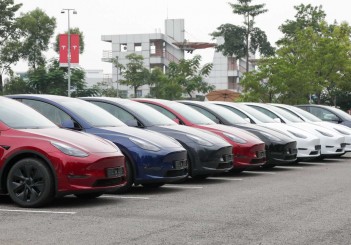Yet NEVS is one of a group of Chinese-funded start-ups that aim to capitalise on disruption in the auto industry as governments around the world create regulatory incentives for electric or hybrid vehicles. Beijing has created a range of incentives to both attract technology-oriented firms into the EV sector and get the public to buy them.
NEVS US$12 billion order for EV cars came from a Beijing-based start-up called Panda New Energy Co. Jiang Dalong, a 51-year-old Chinese-born businessman who acquired Saab in 2012, said the deal with Panda New Energy requires little upfront money from the start-up.
Panda said it plans to lease the cars for commercial fleets, such as taxis and courier services. Jiang owns 43 percent of NEVS, based in Trollhattan, Sweden, through his Beijing-based company, National Modern Energy Holdings.

The NEVS electric car. - Reuters
The city of Tianjin has a 30-percent stake through Tianjin Binhai Hi-tech Industrial Development Area. The rest is owned by Beijing State Research Information Technology Co and Teamsun Technology Co, an information-technology company.
The Chinese-born, Swedish businessman sold his bio-power generation business in China to help fund and focus on NEVS. Jiang said he sees a big opportunity for the technology given the enormous policy help Beijing has lined up for it.
“China is going to be the world’s biggest market for electric cars,” Jiang said in an interview in his office in Beijing. “China has no choice. They have to wean themselves from conventional gasoline combustion cars,” he added, describing the recent sharp uptick in air pollution levels in China's capital as “terrible" and "crazy”. "Big existing automakers are too big. They cannot stop producing conventional gasoline combustion cars. But we can ... switch to new energy cars.”
Beijing's new green car policy is based on the idea that a low entry barrier for electric car technology will allow late-comers to the automotive industry to close a competitive gap with global rivals who have a century's head-start in traditional combustion engines.
China, a major oil importer and blighted by air pollution, has offered generous incentives to the public to buy green cars and forced global automakers to share their EV technology. The policy has helped spawn more than a half-dozen Chinese-funded EV startups in and outside China, whose financial backers includes Baidu , Alibaba , Xiaomi[XTC.UL] and Tencent , as well as LeTV , a streaming video and Internet television provider.
Start-up electric car venture Faraday Future, funded by Chinese Internet billionaire and LeTV founder Jia Yueting, on Monday previewed a technology-heavy concept race car. California-based Faraday hopes to develop it into a range of battery-powered vehicles that can challenge luxury rivals such as Tesla Motors Inc. in the growing market for electric cars.
Jiang said NEVS is exempt from China's regulations requiring a foreign automaker to have a local partner because it plans to produce only electric cars for sale in China.
Jiang said NEVS is building an EV factory in the northeast coastal metropolis of Tianjin. He said he expected to soon get an auto manufacturing license to start producing EVs for Panda New Energy.










